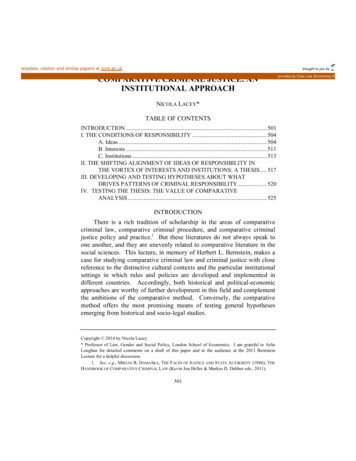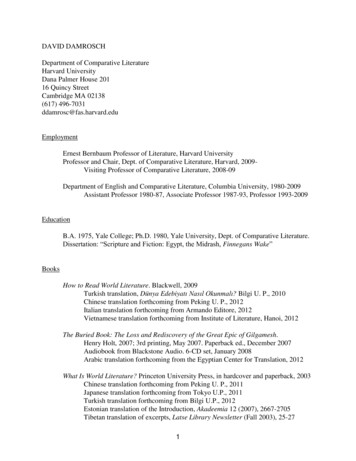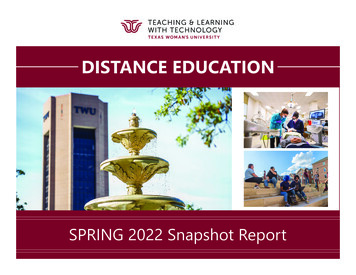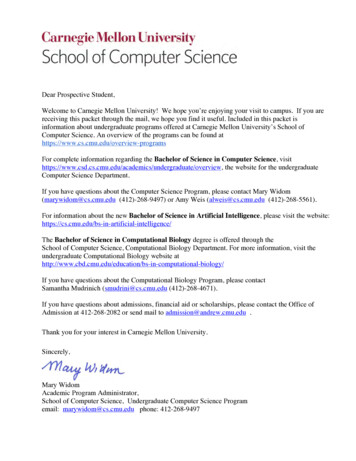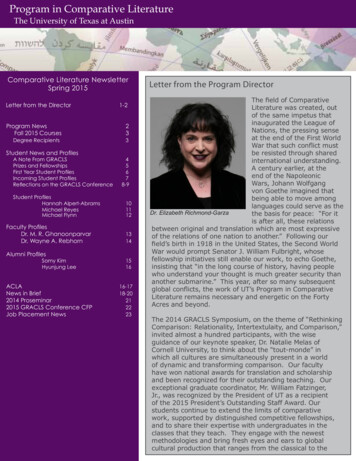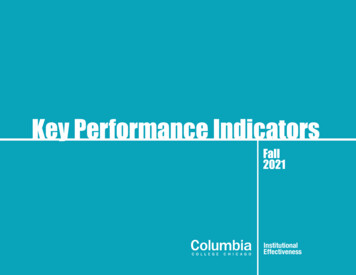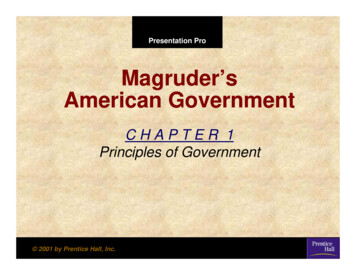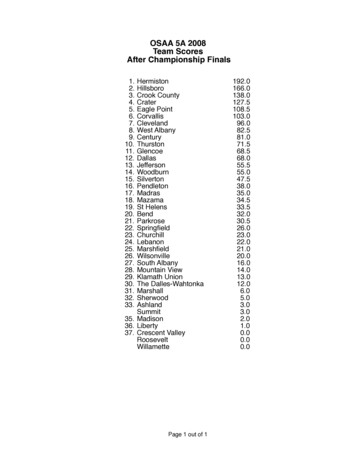
Transcription
PSCI 220SUniversity of Montana, Department of Political ScienceFall 2015Introduction toComparative GovernmentInstructor: Eric H. HinesOffice: NCOR 332Office Hours: MWRF 3:00-4:00Email: eric.hines@umontana.eduCourse Number: PSCI 220SClass Location: UH 210Meeting Time: MWF 9:10-10:00Website: Moodle (http://umonline.umt.edu)CRN (Add/Drop): 71474COURSE DESCRIPTIONComparative government, or comparative politics, is the comparison of politics — who getswhat, when, and how — across different states. The purpose of the course is to develop yourability to describe and explain political behavior through meaningful comparison. The coursefocuses on political development, regimes, participation and representation, policymaking, andpolitical economy. As we examine these issues, we will see how comparing these issues acrossstates helps provide answers to major questions in political science including why individuals,groups, and governments behave in certain ways, who really governs, and why certain politicalbehaviors are seen in certain places at certain times.COURSE LEARNING OUTCOMES AND ASSESSMENTSAfter completing this course’s learning objectives, studentswill have enhanced knowledge and skills to:This will be assessed by:1Describe the nature, structure, and development of keyindividual and group political behaviors and regimes.ExamsWritten Assignments2Use different theoretical approaches to explain politicalbehavior at the individual, group, & organizational level.ExamsWritten Assignments3Evaluate how well conclusions and generalizations aboutpolitical behavior are justified based on available data.ExamsWritten AssignmentsREQUIRED MATERIALSThere is one required textbook for this course available for purchase at the bookstore:O’Neil, Patrick H. 2015. Essentials of Comparative Politics. Fifth edition. New York: W.W.Norton & Company.All additional materials will be available on Moodle.-1-
PSCI 220S: Comparative GovernmentFall 2015COURSE PHILOSOPHY, PEDAGOGY, AND LEARNING OBJECTIVESLearning is more than memorizing facts and answering questions on a test. It is the process ofenhancing your ability to use information to understand of how things work and how to makethem better. This course will enhance your ability to: Ask the right questions and frame good problems, Acquire information and evaluate sources of information, Critically investigate and solve problems, Make choices among different alternatives, Explain concepts to others both orally and in writing and, Generalize to new situations.Learning Objectives{{t-oOulaf-CssIn-CThe structure of this course is influenced by a taxonomyof cognitive skills developed by Benjamin Bloom. Heidentified six steps to the learning process studentsmust complete to master a subject and organized theminto a pyramid (see figure below) to show how morecomplex skills developed on a foundation of simplerones. In this course, we will focus on remembering andunderstanding concepts outside of class, while in-classtime will be focused on applying concepts.slasPedagogyCategories in Bloom's Taxonomy of Cognitive Skills andExpected Location of DevelopmentBloom translated his taxonomy into discrete andmeasurable actions called learning objectives, which arestatements that start with an action (verb) associated with the intended skill and end with anobject describing the knowledge that must be acquired or constructed. Learning objectives foreach course topic are the basis for all instruction and assessment.Student ResponsibilitiesThis learning philosophy and pedagogy imposes upon students the responsibility to:1. Review the learning objectives for each topic.2. Complete all assigned readings and exercises before class.3. Ask the professor for assistance if they difficulty with specific learning objectives.4. Attend class regularly, but only when they are fully prepared to participate.5. Complete all course assignments by their deadlines (Late work is not accepted).6. Review all feedback from the instructor, including feedback posted online.7. Ask for clarification if instructions or feedback are not fully understood.8. Finish the class (University policy on incompletes will be strictly enforced).9. Inform the instructor beforehand if they cannot fulfill these responsibilities.-2-
PSCI 220S: Comparative GovernmentFall 2015CLASS POLICIESAcademic MisconductAll students must practice academic honesty. Academic misconduct is subject to an academicpenalty by the course instructor and/or disciplinary sanction by the University. All students needto be familiar with the Student Conduct Code, which is available for review online at: http://www.umt.edu/vpsa/policies/student conduct.php.Students With DisabilitiesIf you have a disability and feel you need accommodations in this course please present mewith a letter from Disability Services for Students (DSS), Lommasson Center 154 (243-2243),indicating the existence of a disability and the suggested accommodations.GRADING AND COURSE REQUIREMENTSThe grading system used in this course is distinguished from a traditional point-based gradingsystem by the following principles:1. Pass/fail grading: For most assignments, students earn either full credit or no creditdepending on whether they meet specifications defined for each assignment.2. Tokens and Power-ups: Students start with a single token they can exchange fordifferent “power-ups” like resubmitting unsatisfactory work, buying out an exam, oradditional experience points. More tokens can be earned via “side-quests.”3. Quests for Knowledge: Students select their own path to knowledge from a series ofassignments bundled together in “Quests” to earn experience points.4. Leveling-up: As students earn experience points (x.p.) from successful quests, they willlevel-up to a different letter grade for the course.Quests For KnowledgeThe following are the quests for knowledge available at the start of the semester:Quest 1 (Celebrations of Knowledge): This quest consists of three independent short-answertests of basic recall and understanding of course material. Students that receive a 70% orhigher on an exam receive full credit. Each exam is worth up to 100 x.p. (300 x.p. total)Quest 2 (Close-Reading): In this quest, students select three articles published in comparativepolitics from a list provided by the instructor. Students complete a “close reading” of eacharticle and write a 2-page report on the article (100 x.p.).Quest 3 (Comparative Analysis Paper): In this quest, students complete a series of tasks toproduce a six-page paper comparing different countries with respect to a significant economic,social, or political issue. Can’t be combined with Quest 4 (200 x.p.).-3-
PSCI 220S: Comparative GovernmentFall 2015Quest 4 (Constitutional Engineering Paper): In this quest, students complete a series of tasks toproduce a six-page report analyzing the democratization in a country of their choice andrecommending constitutional reforms to promote democratization given its economic, social, &political context. Can’t be combined with Quest 3 (200 x.p.).Side-Quest 1 (Ye Olde Library Assignment): Students passing a short library researchassignment will receive an additional token to exchange for power-ups.Leveling UpYour final grade is based on how much may experience points (x.p.) you earn. Each additional100 experience points will result in leveling up on level. Levels will be translated to grades bythe simple formula that Level 0-1 F, Level 2 D, Level 3 C, Level 4 B, and Level 5 A.COURSE SCHEDULEI reserve the right to make changes to this course schedule. Changes will be posted to Moodleand distributed via email.DateTopicAssignment8/31Introduction; Distribution of Syllabus9/2What is Comparative Politics?O’Neil, Ch. 19/4The Modern State: Definitions and OriginsO’Neil, Ch. 29/7No Class — Labor Day9/9Case Studies in State Formation; Failed StatesSelected Readings on Moodle9/11The Modern State: Regime Types and IdeologyO’Neil, Ch. 3, pgs. 77-889/14States and Identity: NationalismO’Neil, Ch. 3, pgs. 62-77; 88-97.9/16States and Identity: Ethnicity, Religion and Race9/18Nationalism Exercise*Bring Handout to Class (M)9/21States and the Market: Key Concepts and DebatesO’Neil, Ch. 49/23States and the Market: Economic ModelsSelected Readings on Moodle9/25Democratic Institutions: What is Democracy?*O’Neil, Ch. 5, pgs. 127-1319/28Democratization and Regime ChangeO’Neil, Ch. 5, pgs. 131-1369/30Celebration of Knowledge #110/2Democratic Institutions: Executive-Legislative RelationsO’Neil, Ch. 5, pgs. 136-14610/5Democratic Institutions: ElectionsO’Neil, Ch. 5, pgs. 146-159-4-
PSCI 220S: Comparative GovernmentDateFall 2015TopicAssignment10/7Democrastan Exercise*Bring Handout to Class (M)10/9Democratic Institutions: Political Parties & Party SystemsSelected Readings on Moodle10/12 German Election Simulation*Bring Handout to Class (M)10/14 New Democracies Exercise*Selected Readings on Moodle10/16 Democratic Institutions: Civil Society and Case StudiesSelected Readings on Moodle10/19 Film: After Democracy10/21 Authoritarian Institutions: GoverningO’Neil, Ch. 610/23 Authoritarian Institutions: Participation and RepresentationSelected Readings on Moodle10/26 Political Violence: Revolutions and TerrorismO’Neil, Ch. 710/28 Advanced Democracies: Freedom, Equality, and IdentityO’Neil, Ch. 810/30 Celebration of Knowledge #211/2Advanced Democracies: European Integration“Europe in 12 Lessons”11/4Issues in Comparative Politics #1: The EuroCQGP, “Future of the Euro” (M)11/6Postcommunist States: Communism and its aftermathO’Neil, Ch. 911/9Issues in Comparative Politics #2: Communism TodayCQGP, “Communism Today” (M)11/11 No Class —Veteran’s Day11/13 Newly Industrializing and Less-Developed StatesO’Neil, Ch. 1011/16 Issues in Comparative Politics #3: The Rise of AfricaReadings on Moodle (M)11/18 Globalization and Economic SovereigntyO’Neil, Ch. 1111/20 Politics of Diversity: ReligionReadings on Moodle (M)11/23 No Class — Montana Model United Nations Conference11/30 Politics of Diversity: Gender or Gay RightsReadings on Moodle (M)12/2Public Policy: WelfareReadings on Moodle (M)12/4Public Policy: Health Care12/7Issues in Comparative Politics #6: Social Welfare12/9Public Policy: EnvironmentReadings on Moodle (M)12/11 Celebration of Knowledge #3-5-
11/16 Issues in Comparative Politics #3: The Rise of Africa Readings on Moodle (M) 11/18 Globalization and Economic Sovereignty O'Neil, Ch. 11 11/20 Politics of Diversity: Religion Readings on Moodle (M) 11/23 No Class — Montana Model United Nations Conference 11/30 Politics of Diversity: Gender or Gay Rights Readings on Moodle (M)
